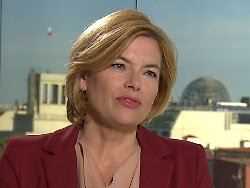There is no perspective for livestock farmers: because of the closure of the Tönnies factory, they have difficulty finding buyers for their pigs. Minister of Agriculture Klöckner therefore appeals to the breeders not to overcrowded their stalls. Other slaughterhouses are said to lose more animals than usual.
In view of the lack of slaughter capacity due to the closure of the Tönnies plant in Rheda-Wiedenbrück, CDU Agriculture Minister Julia Klöckner called on farmers and butchers to react flexibly. You can understand the concerns of the breeders very well. "That is why it is important, on the one hand, that slaughtering capacities are used in other locations, and above all that slaughterings can be postponed if possible," said Klöckner in the "early start" of ntv.
Due to the decommissioning of the Tönnies site, farmers have to find other buyers for 70,000 pigs per week. The Minister of Agriculture spoke of a problem "that we are facing". Everyone in "the chain" must live up to their responsibilities. "Above all, of course, the slaughterhouses."
Klöckner did not want to stimulate the animal owners across the board to reduce production. "You don't just flip the switch," she said. Nevertheless, she gave the advice: "Not to completely fill the barn, that's a smart approach." In conversation with ntv, Klöckner once again explained animal welfare, its concept for the moderate increase in the price of meat and sausages. Meat should not be a luxury commodity, but it should also not be a daily routine.
Klöckner conceded difficulties in the treatment of meat imports, because these too should be burdened with an animal welfare tax. "We are in an internal market. And if we were only going to eat the local meat now, then one would go for it because it is cheaper." However, the levy must "be compatible with European law." That must now be checked.
.
